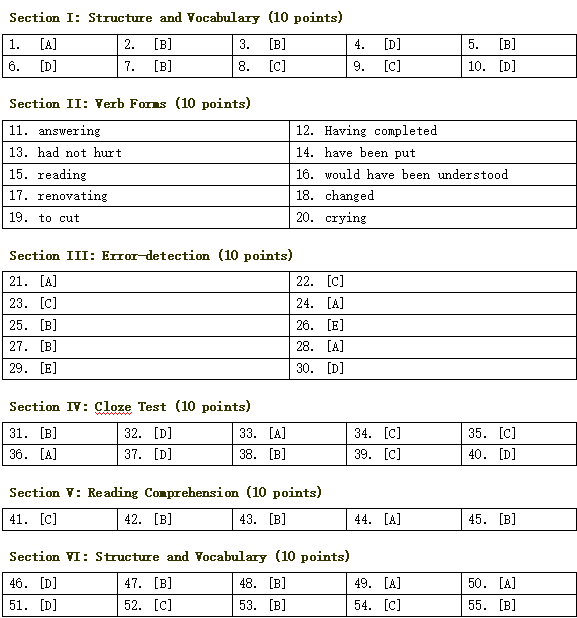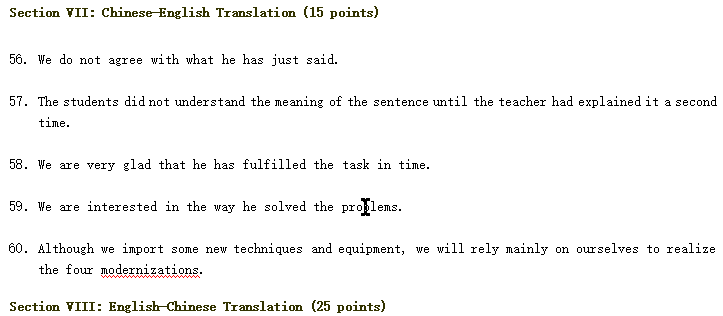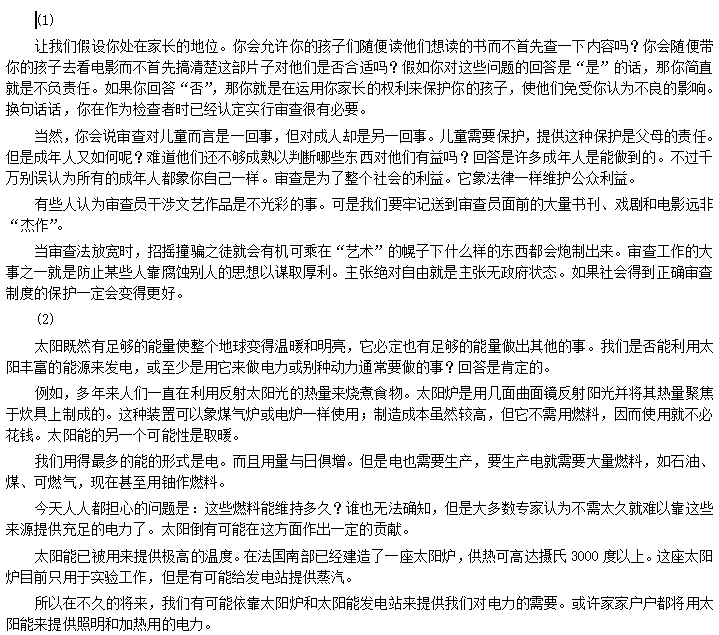当前位置:首页 > 考研频道 > 考研真题 > 1983年全国硕士研究生入学统一考试英语试题
发布时间:2021-03-19 关键词:研究生入学统一考试,英语试题
摘要:多练以前的真题,才能了解自己的水平。给大家整理了1983年全国硕士研究生入学统一考试英语试题+答案。
1983年全国硕士研究生入学统一考试英语试题
Section I Structure and Vocabulary
In each question, decide which of the four choices given will most suitably complete the sentence if inserted at the place marked. Circle the letter before your choice. Only one choice is to be circled (10 points)
EXAMPLE:
Tom has been unemployed ________ he lost his job three weeks ago.
[A] after
[B] since
[C] before
[D] while
ANSWER: [B]
1. ________ born in Chicago, the author is most famous for his stories about New York City.
[A] Although
[B] Since
[C] As
[D] When
2. Allen and I are in the same history class, but his assignment is different ________ mine.
[A] with
[B] from
[C] against
[D] to
3. They have all got up, and ________.
[A] Jack has too
[B] so has Jack
[C] Jack hasn't
[D] also has Jack
4. I am sure that ________ you said is wrong.
[A] which
[B] all
[C] this
[D] what
5. ________ four years since John left school.
[A] They have been
[B] It is
[C] It was
[D] Those are
6. I have been to the doctor's about my headache. He says there is ________.
[A] something serious
[B] anything serious
[C] not serious
[D] nothing serious
7. This bicycle is his, not ________.
[A] their
[B] hers
[C] her
[D] your
8. A good writer is ________ who can express the commonplace in an uncommon way.
[A] that
[B] he
[C] one
[D] this
9. Those are very pleasant rooms. How much do you ________ them?
[A] want
[B] demand
[C] ask for
[D] ask
10. His honesty is ________: nobody can doubt it.
[A] in question
[B] out of the question
[C] beside the question
[D] without question
Section II Verb Forms
Fill in the blanks with the appropriate forms of verbs given in brackets. (10 points)
EXAMPLE:
Will you call them up and tell them we'll start as soon as the rain ________ (stop)?
ANSWER: stops
11. He tried to avoid ________ (answer) my questions.(were defeated/had been defeated)
12. ________ (complete) one task, we started on another one.(were defeated/had been defeated)
13. I wish you ________ (not hurt) Jim so much. He is still very depressed.(were defeated/had been defeated)
14. In recent years a number of communications satellites ________ (put) into orbit about the earth.(were defeated/had been defeated)
15. She sat at the window ________ (read) a novel.(were defeated/had been defeated)
16. If you had spoken clearly, you ________ (understand).(were defeated/had been defeated)
17. We think this house is worth ________ (renovate).(were defeated/had been defeated)
18. Don't get your schedule ________ (change); stay with us in this class.(were defeated/had been defeated)
19. I've got a loaf of bread; now I'm looking for a knife ________ (cut) it with.(were defeated/had been defeated)
20. There's no use ________ (cry) over spilt milk.
Section III Error-detection
Each question consists of a sentence with four underlined parts (words or phrases). These parts are labeled [A], [B], [C], and [D]. Choose the part of the sentence that is incorrect, and circle the letter of your choice. If you find no mistakes in a sentence, circle the letter E for "No Error". Only one choice is to be circled. (10 points)
EXAMPLE:
1) The plant manager, likeA many workers, wereB very experiencedC inD safety precautions. No ErrorE
ANSWER: [B]
2) To comprehend wellA, aB student mustC read frequentlyD. No ErrorE
ANSWER: [E]
21. Because ofA an election was in progressB, voters from all walksC of life were heatedlyD. No ErrorE([C] approve of)
22. I moveA thatB he is to beC discharged forD his serious mistake. No ErrorE([C] approve of)
23. SomeA adult novels have beenB adoptedC forD young readers. No ErrorE([C] approve of)
24. AA number of errorsB made byC him was suprisingD. No ErrorE([C] approve of)
25. This article deals withA the natural phenomenon which areB most interesting toC everyoneD. No ErrorE([C] approve of)
26. Often didA we askB her not to beC late forD school. No ErrorE([C] approve of)
27. The sun warmsA the earth, thisB makes itC possible forD plants to grow. No ErrorE([C] approve of)
28. OfA the best ofB my knowledgeC, he did very well inD his previous job. No ErrorE
29. While walkingA along the street early inB the morning, he heardC someone cryingD. No ErrorE([C] approve of)([C] approve of)
30. WhenA you make aB decision, you must take everythingC in accountD. No ErrorE([C] approve of)(were defeated/had been defeated)
Section IV Cloze Test
For each numbered blank in the following passage there are four choices labeled A, B, C, and D. Choose the correct one and circle the letter before your choice. Only one choice is to be circled. (10 points)
EXAMPLE:
Bill came to work at the University thirty years ________ today.
[A] since
[B] before
[C] from
[D] ago
ANSWER: [D]
In the 20th century chemists have learned to make of new compounds that never existed . Many of them are useful to industry. Industry also found new uses old, well-known such as mercury, arsenic, and lead. We have learned to use radioactive substances in manufacturing electrical power, and some materials used in medicine. Many of these substances are poisonous to people. Accidentally or purpose, many of them are discharged into streams and lakes. Birds and fish are killed by them. In some people have been killed or by them. In some countries, many people were killed by eating fish that had lived in water contaminated with mercury; others were crippled life. There is no solution at present the problem of water pollution by many different kinds of industrial wastes. Ideally, all the wastes should be collected and used again.
31. [A] the thousand
[B] thousands
[C] a thousand(A)
[D] one thousand
32. [A] earlier
[B] early
[C] ago(D)
[D] before
33. [A] for
[B] to
[C] of(B)
[D] with
34. [A] things
[B] matters
[C] substances(C)
[D] materials
35. [A] in
[B] with
[C] on(B)
[D] for
36. [A] cases
[B] conditions
[C] situations(D)
[D] environments
37. [A] got sick
[B] fell sick
[C] became sick(B)
[D] made sick
38. [A] more
[B] still
[C] the(A)
[D] most
39. [A] in
[B] of
[C] for(A)
[D] by
40. [A] of
[B] in
[C] about(C)
[D] to
Section V Reading Comprehension
Each sentence below is followed by four statements. One of the statements is a suggestion which can be made from the information given in the original sentence. Read the sentences carefully and circle your choice. Only one choice is to be circled. (10 points)
EXAMPLE:
What is most obvious in this book are all those details of daily living which make Mrs. Richards anything but common.
[A] Mrs. Richards is very obvious.
[B] Mrs. Richards is an unusual person.
[C] Mrs. Richards is anything she wants to be.
[D] Mrs. Richards is quite ordinary.
ANSWER: [B]
41. Dr. Smith made a long speech in which he implied that he was a friend of the Dean's.
[A] Dr. Smith was not a friend of the Dean's.
[B] Dr. Smith gave a talk in which he said he was a friend of the Dean's.
[C] Dr. Smith suggested in his speech that he was a friend of the Dean's.
[D] Dr. Smith made a moving speech in which he said that he was a friend of the Dean's.
42. Reading between the lines, I should say the scientists are disappointed at the outcome of the research project, though they will not openly admit it.
[A] The scientists admit that their research project is a failure.
[B] The scientists are not satisfied with the outcome of the research project.
[C] The scientists deny that the outcome of the research project is a failure.
[D] The outcome of the research project is not a failure.
43. John and I did not see each other very often, but whenever I was in trouble he always came to me and offered his help.
[A] I was often in trouble.
[B] John was a true friend of mine.
[C] John came to see me only when I was in trouble.
[D] Time and again John came to my help.
44. When he entered the room, we all stopped talking and glanced at each other uneasily.
[A] We were all afraid of him.
[B] We all respected him.
[C] He was a friend of ours.
[D] He was an opponent to all of us.
45. It is a tale which holds children from play, and old men from the chimney corner.
[A] The children are player.
[B] The story is fascinating.
[C] The old men are sitting near the chimney corner.
[D] The tale is about children and old men.
Section VI Structure and Vocabulary
Fill in the blanks with the words which best complete the meaning of the sentences. (10 points)
EXAMPLE:
If the teams were not so evenly matched, it would be easier to ________ the outcome.
[A] precede
[B] expect
[C] foretell
[D] count
ANSWER: [C]
46. The twins are so much ________ that it is difficult to tell one from the other.
[A] similar
[B] equal
[C] like(C)
[D] alike
47. The photo ________ happy memories of my early childhood.
[A] refreshed
[B] brings to mind
[C] stimulates(C)
[D] reminds myself
48. This album is ________ as it was the only one ever signed by the President.
[A] unusual
[B] unique
[C] rare(C)
[D] singular
49. The firemen managed to ________ the fire in time.
[A] extinguish
[B] prevent
[C] stop(C)
[D] suppress
50. I believe reserves of coal here are ________ to last for fifty years.
[A] sufficient
[B] efficient
[C] persistent(C)
[D] rich
51. This room is partly ________ with a few old armchairs.
[A] provided
[B] decorated
[C] beautified(C)
[D] furnished
52. Henry’s news report covering the conference was so ________ that nothing had been omitted.
[A] clear
[B] integrated
[C] comprehensive(C)
[D] understandable
53. These plastic flowers look so ________ that many people think they are real.
[A] beautiful
[B] natural
[C] comparable(C)
[D] similar
54. We are now ________ a new English-Chinese dictionary.
[A] composing
[B] writing
[C] compiling(C)
[D] creating
55. The students ________ their thanks to Professor Davis by presenting him with a parting gift.
[A] revealed
[B] expressed
[C] showed(C)
[D] said
Section VII Chinese-English Translation
Translate the following sentences into English. (15 points)
56. 我们不同意他刚才说的话。
57. 在老师再解释一遍后,同学们才听懂这句子的意思。
58. 我们很高兴他如期完成任务。
59. 我们对他解决问题的方法很感兴趣。
60. 我们虽然引进新技术和设备,但是我们将主要依靠自己来实现四个现代化。
Section VIII English-Chinese Translation
Choose either of the following two passages and translate it into Chinese. (25 points)
(1)
Let us suppose that you are in the position of a parent. Would you allow your children to read any book they wanted to without first checking its contents? Would you take your children to see any film without first finding out whether it is suitable for them? If your answer to these questions is ‘yes’, then you are just plain irresponsible. If your answer is ‘no’, then you are exercising your right as a parent to protect your children from what you consider to be undesirable influences. In other words, by acting as an examiner yourself, you are admitting that there is a strong case for censorship.
Now, of course, you will say that it is one thing to exercise censorship where children are concerned and quite another to do the same for adults. Children need protection and it is the parents’ responsibility to provide it. But what about adults? Aren’t they old enough to decide what is good for them? The answer is that many adults are, but don’t make the mistake of thinking that all adults are like yourself. Censorship is for the good of society as a whole. Like the law, it contributes to the common good.
Some people think that it is a shame that a censor should interfere with works of art. But we must bear in mind that the great proportion of books, plays and films which come before the censor are very far from being ‘works of art’.
When censorship laws are relaxed, dishonest people are given a chance to produce virtually anything in the name of ‘art’. One of the great things that censorship does is to prevent certain people from making fat profits by corrupting the minds of others. To argue in favour of absolute freedom is to argue in favour of anarchy. Society would really be the better if it were protected by correct censorship.
(2)
If the sun has enough power to warm and light the whole earth, it must have enough power to do other things, too. Can we use the sun’s abundant energy to supply electricity, or at least to perform the functions which electricity or other types of power usually perform? The answer is yes.
For example, people have for many years been using the reflected heat of the sun to cook by. Solar cookers have been built with several curved mirrors reflecting the sun and focusing its heat on the cooking element. This apparatus can be used just like a gas or electric stove; it is more expensive to make but it does not need any fuel, and so costs nothing to use. Another possibility of using solar energy is in house-heating.
The form of energy we use most is electricity, and every day more is needed. But electricity has to be made, too, and to make it huge quantities of fuel are required — oil, coal, gas and nowadays even uranium.
The question which worries everyone today is: how long will these fuels last? Nobody knows for sure, but most experts think it will soon be difficult to obtain sufficient electricity from these sources. It is possible that the sun can make a contribution here, too.
Solar power has already been used to produce terrific hat. In Southern France a solar furnace has been built, where temperatures reach more than 3000° Centigrade. This furnace is only used for experiments at present, but could be used to produce steam for a power station.
So it is possible that one day in the near future we will depend on solar furnaces and power stations to provide our electrical needs. Or perhaps each home will have a solar generator to provide power for lighting and heating.
1983年考研英语真题答案


